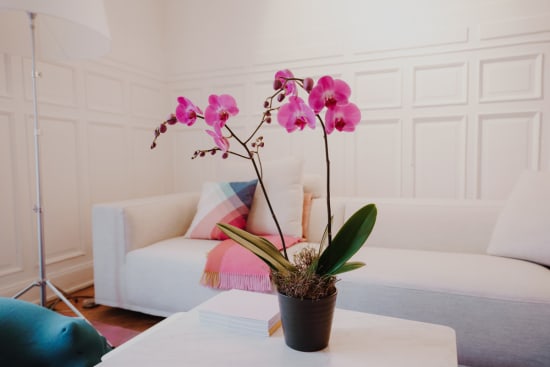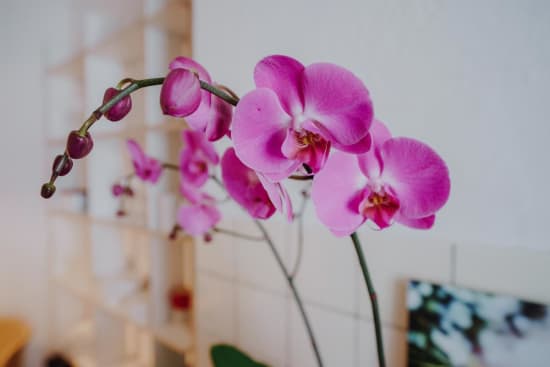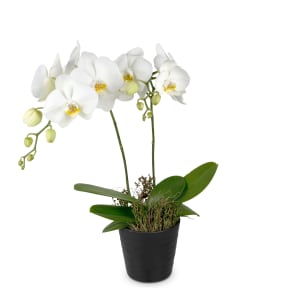- Orchids should be watered sparingly rather than generously. When you do water an orchid, it is best to place the plant in a water bath and then let it drain off thoroughly. Orchids absolutely cannot stand being waterlogged.
- For a medium-sized pot, it is enough to water the plant once a week in winter and possibly twice a week in summer. The frequency depends on the size of the pot and the variety of orchid. Tip: lift the plastic orchid pot briefly. If the plant seems unusually light it needs watering; if the pot is still heavy you can wait a little longer.
Care tips for orchid plants
Orchids are exclusive and exotic. As easy to care for plants, they are a noble gift and last for many months with a little know-how.

Care tips
Orchid care is actually quite simple. Here are some tips:

- Use lukewarm water with as little lime as possible.
- Most orchids come from regions with high humidity. You will provide sufficient humidity by spraying the leaves with a special orchid leaf care product, which also acts as a dust repellent.
- As the growth phase of most orchids is from spring to autumn, feed it every 2-4 weeks during this period. In between times, give it pure water to flush out salt residues. You should feed it much less in winter. Special liquid orchid food is best.

- Only ever cut off dried-up parts. If a stem is still green, leave it even if it no longer displays any blooms. It is not unusual for an orchid to put out new shoots at precisely that point.

Recognizing care errors
Rot is the worst enemy of any orchid. The most important thing is therefore not to overwater your orchid. However, there are other things that will harm this sophisticated exotic. Here are some tips about how to recognize the signs of errors in care:
- A large number of small, fresh shoots indicates that the room temperature is too high.
- Brown edges and points to the leaves could indicate a lack of humidity.

- Long, thin and pale leaves or shoots are a symptom of insufficient light.
- Reddish leaves or shoots are more likely to be a sign of too much sun.
Other important tips
Care tips for flowers, bouquets and arrangements
Here you will find the most important rules: «golden ones», which are best learned by heart, but then also special tips for cut flowers, bouquets and flower arrangements.
General tips for indoor plants
Whether at home or in the office, indoor plants have been popular for years. Here you will find answers to questions about how to choose, water and fertilize them - even plants for men.
Care tips for special cut flowers
Some popular cut flowers are delicate. It is better to know how to deal with them. Here are the main tips.
Care tips plants for balcony & terrace
Here you will find care tips for some particularly attractive plants, which we change or add to from time to time depending on trends and supply.
Care tips for orchid plants
Orchids are exclusive and exotic. As easy to care for plants, they are a noble gift and last for many months with a little know-how.
Care tips for Advent wreaths & candles
What can be done to keep an Advent wreath beautiful throughout December? And how do you buy and treat candles? Here are our answers.
Care tips for Christmas flowers
When it comes to Christmas spirit, poinsettias, amaryllis and Christmas roses can't be missing in bouquets and arrangements. Here are our tips.
Care tips for Christmas plants
Fancy a pretty little Christmas tree in a pot, poinsettias, amaryllis and Christmas roses? Here you will find the appropriate care tips.








